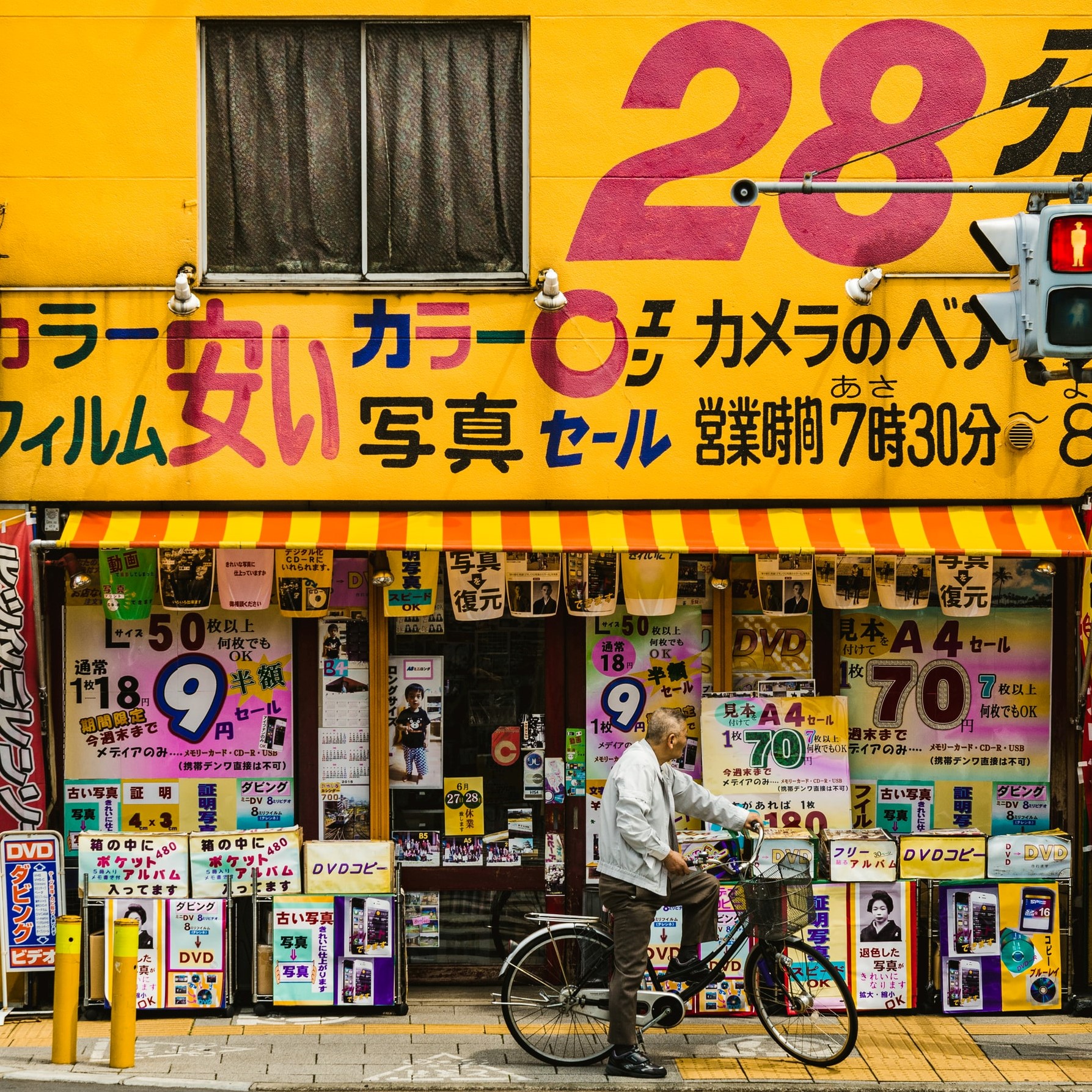Photo by Ryoji Iwata on Unsplash
In this post we’ll learn the numbers in Japanese , and we’ll see a few common examples of how they’re used.
0-10
Let’s start with ゼロ、れい zero, rei zero through 十 juu ten.
- ゼロ、れい zero, rei zero
- 一 ichi one
- 二 ni two
- 三 san three
- 四 yon, shi four
- 五 go five
- 六 roku six
- 七 nana, shichi seven
- 八 hachi eight
- 九 kyuu nine
- 十 juu ten
These numbers are often called Sino-Japanese numbers, because they were borrowed from Chinese. There is another set of numbers in Japanese, the so-called Native Japanese numbers.
Native Japanese 1-10
Japanese has a second set of numbers one through ten, called Native Japanese numbers.
- 一つ (ひとつ) hitotsu one
- 二つ (ふたつ) futatsu two
- 三つ (みつ) mitsu three
- 四つ (よつ) yotsu four
- 五つ (いつつ) itsutsu five
- 六つ (むっつ) muttsu six
- 七つ (ななつ) nanatsu seven
- 八つ (やっつ) yattsu eight
- 九つ (ここのつ) kokonotsu nine
- 十 (とう) tō ten
GRAMMAR TIP: There are only Japanese native numbers for one through ten, so sums higher than ten always use the Sino-Japanese numbers. You’ll see later that you typically need a counter when using Sino-Japanese numbers, but that’s not the case with Native Japanese numbers. You can use them to count a lot things in small quantities, but not people, time, and money.
- 二つの部屋
futatsu no heya
two rooms - 三つのリンゴ
mitsu no ringo
three apples
11-19
For 11 through 19, we have to return to Sino-Japanese numbers. To form teens, simply start with 十 juu (ten) and add the ones place.
- 十一 juuichi eleven
- 十二 juuni twelve
- 十三 juusan thirteen
- 十四 juuyon fourteen
- 十五 juugo fifteen
- 十六 juuroku sixteen
- 十七 juunana, juushichi seventeen
- 十八 juuhachi eighteen
- 十九 juukyuu nineteen
20-99
For tens, simply add 十 juu to the basic ones place number. So 二 ni (two) plus 十 juu (ten) is twenty, 三 san (three) plus 十 juu (ten) is thirty, and so on. For numbers in between, just add the ones place number.
- 20 二十 nijuu
- 21 二十一 nijuuichi
- 22 二十二 nijuuni
- 23 二十三 nijuusan
- 24 二十四 nijuuyon
- 25 二十五 nijuugo
- 30 三十 sanjuu
- 40 四十 yonjuu
- 50 五十 gojuu
- 60 六十 rokujuu
- 70 七十 nanajuu
- 80 八十 hachijuu
- 90 九十 kyuujuu
Higher Numbers
And here are higher number from 100 on. Notice that Japanese adds a unit at 10,000, called 万 man. 100,000 is not one hundred thousand, but rather ten 万 man.
- 100 百 hyaku
- 200 二百 nihyaku
- 300 三百 sanbyaku
- 450 四百五十 yonhyaku gojuu
- 1,000 千 sen
- 2,000 二千 nisen
- 10,000 一万 ichiman
- 100,000 十万 juuman
- 1,000,000 百万 hyakuman
Using Numbers
Let’s see some typical examples of how you might use numbers. With Native Japanese numbers, when you use them, you can typically use the number on its own.
- 部屋は四つあります。
Heya wa yottsu arimasu.
There are four rooms. - りんごを二つ食べました。
Ringo o futatsu tabemashita.
I ate two apples.
There are two special number expressions used for people: 一人 (ひとり) hitori one person, 二人 (ふたり) futari two people.
- 女兄弟が何人いますか。
On’na kyōdai ga nan’nin imasu ka.
How many sisters do you have? - 女兄弟が二人います。
On’na kyōdai ga futari imasu.
I have two sisters.
When you use Sino-Japanese numbers, you use a counter. Counters are special particles that are used for counting, a bit like two head of cattle, three cups of coffee, or five grains of sand. In Japanese, there are many counters, and you choose your counter based on the thing that you’re counting. If you’d like to see some common counters, check out the grammar tip below the examples.
- お水を二杯ください。
Omizu o nihai kudasai.
Two glasses of water, please. - {二名・三名・四名・五名}です。
{nimē, san’mē, yon’mē, gomē} desu.
A table for two/three/four/five people, please. (lit, we are two/three/four/five people). - 今何時ですか。
Ima nanji desu ka.
What time is it? - 夜7時です。
Yoru shichiji desu.
It’s seven o’clock in the evening. - 午前11時です。
Gozen jūichiji desu.
It’s eleven o’clock in the morning. - 37号室で、3階です。
Sanjūnana gōshitsu de, sangai desu.
It’s room number thirty seven, on the third floor. - 何歳ですか。
Nansai desu ka.
How old are you? - {20歳・35歳・50歳}です。
{Hatachi/Sanjūgosai/Gojussai} desu.
I’m twenty/ thirty five/ fifty years old. - いくらですか。
Ikura desu ka.
How much does it cost? - 1000円です。
Sen en desu.
It costs ¥1000. - 電話番号は何ですか。
Denwa banō wa nan desu ka.
What is your phone number? - 私の電話番号は080-1234-5678です。
Watashi no denwa bangō wa zero hachi zero, ichi ni san shi, go roku shichi hachi desu.
My phone number is 080-1234-5678. - ホテルはどこですか。
Hoteru wa doko desu ka.
Where is the hotel? - ホテルは銀座3丁目にあります。
Hoteru wa Ginza sanchōme ni arimasu.
The hotel is in Ginza 3 chōme.
GRAMMAR TIP!
When you use Sino-Japanese numbers, you typically need to use a counter along with the number. Your choice of counter depends on what you’re counting; some of the most commonly used counters are given below. Different structures with counters are possible, but two common ones are:
- number + counter + の no + noun
二本の木があります。
ni-hon no ki ga arimasu.
There are two trees. - noun + particle + number + counter
木が二本あります。
ki ga ni-hon arimasu.
There are two trees.
- 人 nin: people (three or more; 一人hitori is one person and 二人 futari is two people)
- 名 mei: people (polite)
- 杯 pai, hai, bai: glasses, cups, bowls
- 個 ko: small round objects (apples, candy, etc.)
- 枚 mai: flat, thin sheets or objects (paper, photos, plates, shirts, etc.)
- 冊 satsu: bound volumes (books, magazines, etc.)
- 台 dai: machines (cars, bikes, machines, computers, appliances, etc.)
- 本 hon, pon, bon: long thin objects (pens, trees, ties, rivers, roads, etc.)
- 円en: yen
- 階 gai, kai: floors
- 匹 hiki, piki, biki: small animals, insects, fish
- 頭 tou: large animals (cows, horses, etc.)
- 分 fun, pun: minutes
- 時 ji: hours
- 年 nen: years
Learn Japanese with the Language Garage
Check out our other posts on Japanese language, culture, and more. And if you’re looking for convenient and affordable live Japanese lessons with a real teacher, check out the Language Garage. Our lessons are given online in a virtual classroom, so it doesn’t matter where you live or work – we can come to you. And we have flexible options, with a free trial so that you can decide if there’s a fit. Check us out!





